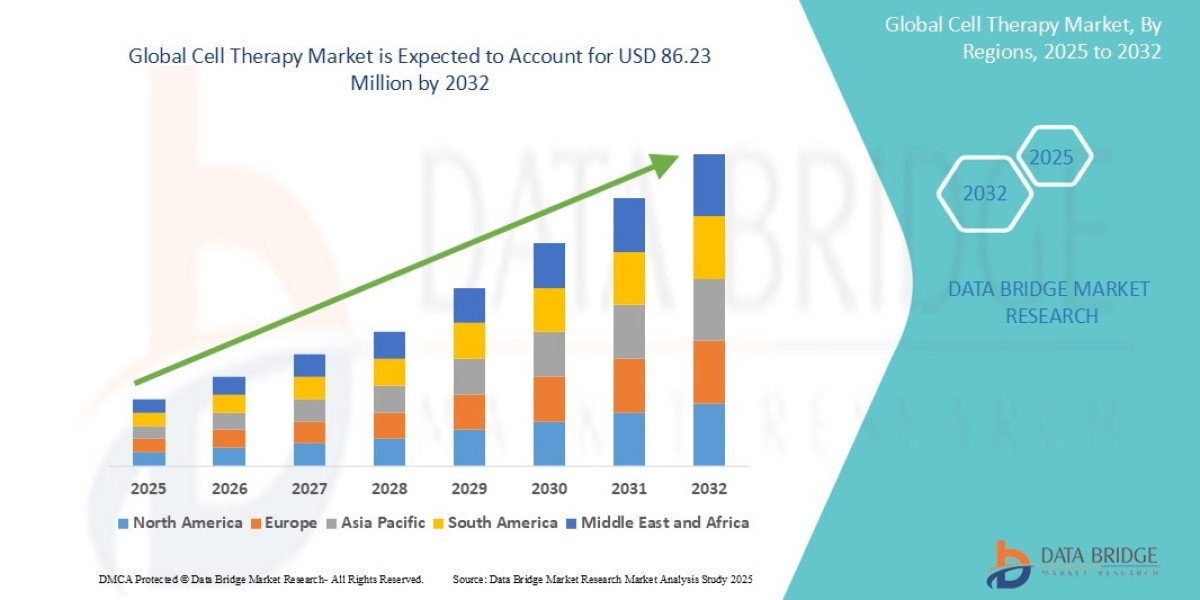Cell Therapy Market: Innovations, Growth Drivers, and Future Outlook
The global cell therapy market size was valued at USD 21.16 million in 2024 and is expected to reach USD 86.23 million by 2032, at a CAGR of 19.20% during the forecast period.
The global cell therapy market is witnessing significant growth, driven by advancements in regenerative medicine, increasing prevalence of chronic diseases, and growing investments in biotechnology research. Cell therapy, which involves the administration of living cells to treat or prevent diseases, has emerged as a promising solution for conditions where conventional treatments are insufficient. This market encompasses a wide range of therapies including stem cell therapy, immune cell therapy, and genetically modified cell therapy, among others.
Overview of Cell Therapy
Cell therapy is a type of regenerative medicine that aims to repair, replace, or regenerate damaged tissues or organs. Unlike traditional pharmaceuticals, which rely on chemical compounds to influence biological processes, cell therapy directly utilizes live cells to restore normal function. These cells can be derived from the patient (autologous) or from a donor (allogeneic) and can be manipulated in laboratories to enhance therapeutic efficacy.
Unlock detailed insights into the growth path of the Cell Therapy Market.Download full report here:
https://www.databridgemarketresearch.com/reports/global-cell-therapy-market
The key types of cell therapy include:
Stem Cell Therapy: Utilizes stem cells, which have the ability to differentiate into various cell types, to treat conditions such as blood disorders, orthopedic injuries, and neurodegenerative diseases.
Immune Cell Therapy: Involves modifying immune cells to target and destroy cancer cells, with chimeric antigen receptor T-cell (CAR-T) therapy being a notable example.
Gene-Modified Cell Therapy: Combines gene therapy and cell therapy by genetically altering cells to correct genetic defects or enhance immune responses.
Market Drivers
Several factors are driving the rapid growth of the cell therapy market.
Rising Prevalence of Chronic Diseases
The increasing incidence of cancer, cardiovascular diseases, neurological disorders, and autoimmune conditions has created a strong demand for innovative therapies. Conventional treatments often fail to provide long-term solutions, making cell therapy an attractive alternative.
Advancements in Biotechnology and Stem Cell Research
Technological advancements have enhanced the safety, efficacy, and scalability of cell therapies. Improved cell isolation, culture techniques, and genetic modification technologies are enabling the production of high-quality therapeutic cells.
Increasing Investment and Funding
Governments, private investors, and biotechnology companies are investing heavily in cell therapy research and development. Funding initiatives and collaborations are accelerating clinical trials and commercial launches of new therapies.
Regulatory Approvals and Support
Regulatory bodies in North America, Europe, and Asia-Pacific are increasingly providing streamlined approval pathways for regenerative medicine products. This regulatory support is crucial for bringing innovative cell therapies to market more quickly.
Growing Awareness and Acceptance
As awareness of the potential benefits of cell therapies rises among healthcare professionals and patients, adoption rates are increasing. Successful outcomes in clinical trials and high-profile cases have contributed to broader acceptance.
Market Segmentation
The cell therapy market can be segmented based on product type, application, end-user, and region.
By Product Type
Stem Cells: Embryonic, adult, and induced pluripotent stem cells.
Immune Cells: T-cells, natural killer (NK) cells, and dendritic cells.
Gene-Modified Cells: CAR-T cells, TCR-engineered cells, and others.
By Application
Oncology: Treating various types of cancers including leukemia, lymphoma, and solid tumors.
Cardiovascular Diseases: Regenerating damaged heart tissues post-myocardial infarction.
Neurological Disorders: Addressing conditions such as Parkinson’s disease, Alzheimer’s disease, and spinal cord injuries.
Orthopedic Disorders: Treating bone and cartilage defects.
Autoimmune Diseases: Modulating immune responses to manage conditions like rheumatoid arthritis.
By End-User
Hospitals and Clinics: Primary sites for administering cell therapy treatments.
Research Institutes: Focused on preclinical and clinical development of new therapies.
Specialty Clinics and Centers: Offering advanced therapies such as CAR-T and stem cell therapies.
By Region
North America: The largest market due to advanced healthcare infrastructure, high R&D investment, and favorable regulatory frameworks.
Europe: Strong growth attributed to increasing government funding and clinical research initiatives.
Asia-Pacific: Rapid expansion driven by rising healthcare expenditure, growing patient population, and emerging biotechnology companies.
Rest of the World: Gradual adoption in regions like Latin America and the Middle East due to increased awareness and investment.
Challenges in the Market
Despite the promising potential, the cell therapy market faces several challenges:
High Cost of Therapy: Cell therapies are expensive, limiting accessibility for patients in low- and middle-income regions.
Complex Manufacturing and Storage: Maintaining cell viability and ensuring quality during manufacturing, transportation, and storage is technically challenging.
Regulatory Hurdles: Despite progress, the regulatory landscape is still evolving, which can delay approvals and commercialization.
Risk of Immune Reactions: Allogeneic therapies carry a risk of immune rejection, requiring careful matching and immunosuppression protocols.
Key Market Trends
Personalized Medicine
Cell therapy is increasingly being tailored to individual patient profiles, enabling personalized treatment plans that improve efficacy and reduce side effects.
Combination Therapies
Combining cell therapy with immunotherapy, chemotherapy, or other treatment modalities is becoming a common strategy to enhance overall outcomes, particularly in oncology.
Technological Innovations
Automation, bioreactors, and AI-based cell selection techniques are transforming the manufacturing process, reducing costs, and increasing scalability.
Expansion in Emerging Markets
Companies are expanding into emerging markets to tap into the growing patient base and increase global accessibility of advanced cell therapies.
Major Players
The global cell therapy market is highly competitive, with key players including:
Novartis AG
Kite Pharma, Inc. (a Gilead Company)
Celgene Corporation (a Bristol-Myers Squibb Company)
Mesoblast Limited
Fate Therapeutics, Inc.
Lonza Group AG
Miltenyi Biotec
Bluebird Bio, Inc.
These companies are actively engaged in research, development, strategic collaborations, and mergers & acquisitions to strengthen their market presence.
Future Outlook
The cell therapy market is expected to continue its robust growth over the next decade, fueled by ongoing technological advancements, increased clinical success, and growing patient awareness. The market is projected to expand significantly as new therapies gain regulatory approval and commercial adoption increases. Emerging trends such as allogeneic off-the-shelf therapies and gene-edited cell therapies are likely to reshape the competitive landscape, making treatments more accessible and cost-effective.
With continuous innovation and supportive policies, the cell therapy market holds the potential to transform the future of healthcare, offering hope for patients suffering from previously untreatable conditions.
FAQs
What are the main types of cell therapy available today?
How do stem cells contribute to regenerative medicine?
What is the difference between autologous and allogeneic cell therapy?
Which diseases can be treated with cell therapy?
What are the key challenges in the commercialization of cell therapies?
How is CAR-T cell therapy different from traditional cancer treatments?
What role do government regulations play in the cell therapy market?
How are technological advancements influencing cell therapy development?
What is the market growth projection for cell therapy over the next decade?
How can emerging markets benefit from cell therapy adoption?
Conclusion
The cell therapy market is at the forefront of a healthcare revolution, offering innovative solutions for complex diseases that conventional treatments cannot fully address. With advancements in technology, increasing investment, and growing awareness, the market is poised for substantial growth. Despite challenges related to cost, manufacturing, and regulation, the continuous evolution of therapies and expanding global accessibility signal a promising future. The integration of personalized medicine, combination therapies, and technological innovations will play a pivotal role in driving the market forward, making cell therapy a cornerstone of modern medicine.
Browse More Reports:
Global Cement Kiln Co-Processing Fuels Market
Global DIN Rail Power Supply Market
Global Innerspring Mattress Market
Global Mobile Analytics Market
Global Permethrin Market
Global Synthetic Fruit Flavor Market
Global Woodhouse Sakati Syndrome Market
Global Wrist Wearable Market
Global 2-Methylpropylbenzene (Isobutyl Benzene) Market
Global Automotive Third Party Logistics Market
Global Cloud Personal and Entry Level Storage (PELS) Market
Global Electric Vehicles Battery Tray Market
Global Glutaric Acid Market
Global Kennedy's Disease Treatment Market
Global Multiple Hereditary Exostosis Market
About Data Bridge Market Research:
An absolute way to forecast what the future holds is to comprehend the trend today!
Data Bridge Market Research set forth itself as an unconventional and neoteric market research and consulting firm with an unparalleled level of resilience and integrated approaches. We are determined to unearth the best market opportunities and foster efficient information for your business to thrive in the market. Data Bridge endeavors to provide appropriate solutions to the complex business challenges and initiates an effortless decision-making process. Data Bridge is an aftermath of sheer wisdom and experience which was formulated and framed in the year 2015 in Pune.
Contact Us:
Data Bridge Market Research
US: +1 614 591 3140
UK: +44 845 154 9652
APAC : +653 1251 975
Email:- corporatesales@databridgemarketresearch.com




